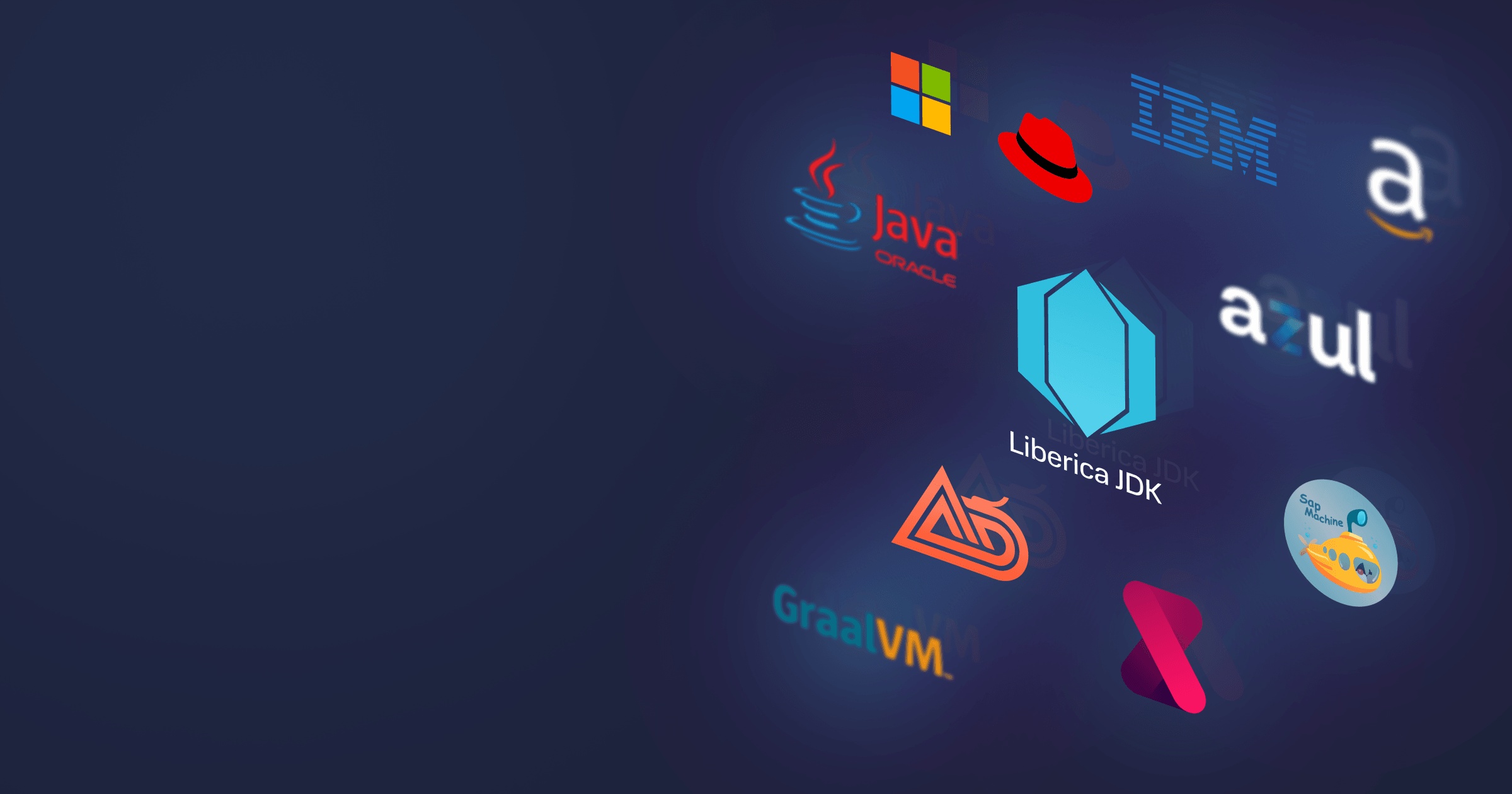Spikes of interest towards Oracle Java alternatives coincide with recurrent changes to Oracle’s Java licensing, the latest one — a new pricing model based on employee count — bringing especially grave consequences for big enterprises.
If you are tired of endless roller coaster riding with Oracle, migrate to one of the major OpenJDK distributions. We prepared an overview of the seven most popular solutions with a comparative table of prominent features. You can also download the indicated table in a PDF format.
Table of Contents
Liberica JDK
|
Vendor |
BellSoft |
|
Versions and builds |
|
|
Advantages |
|
|
Disadvantages |
|
Liberica JDK is an open-source TCK-verified Java runtime developed by BellSoft, a renowned company in the industry and a member of the OpenJDK Vulnerability Group, the Java Community Process Executive Committee (JCP EC), and the GraalVM Project Advisory Board. Its engineers are engaged in contributing fixes and patches to OpenJDK, even those made for customers, guaranteeing no vendor lock-in.
Liberica JDK is used by default in Paketo buildpacks and recommended by VMware for use with Spring Framework. Liberica Native Image Kit (a GraalVM-based native image utility) is the default native-image compiler in Spring Native.
BellSoft provides enterprise support and security updates for legacy Java versions 6 & 7, LTS versions 8, 11, 17, 21, and a current JDK version, and the GraalVM Native Image technology. LTS versions enjoy extended support lifecycle of 8.5 years. Furthermore, Liberica JDK supports the broadest range of system configurations on the market.
BellSoft provides both stabilized CPU (Critical Patch Update) builds with security patches and PSU (Patch Set Update) builds with patches and non-critical fixes as part of quarterly update cycle. Stabilized builds are perfect for enterprise use as they eliminate the risk of unexpected behavior after the update.
The company offers dedicated Liberica JDK builds tailored to specific needs:
- A Standard version with all necessary libraries provided as is (vanilla builds);
- A Full version with OpenJFX for writing GUI apps;
- Liberica JDK Lite optimized for the cloud with a minimal footprint. BellSoft created the most miniature containers on the market based on Liberica Lite, which take up only 40.32 MB;
- A version of Liberica JDK with enhanced performance on Arm, which is especially relevant for embedded systems that mainly utilize this architecture.
The BellSoft engineers have a vast expertise in optimizing Java performance on Arm processors: they implemented JEP315: Improve Aarch64 Intrinsics into OpenJDK and support the ARM32 port.
Enterprises and developers get the most complete Java experience with the broadest range of supported platforms, builds, and versions. What is more, BellSoft offers a unified solution for enterprises — Alpaquita Cloud Native Platform (ACNP), which includes the JDK, Alpaquita Linux optimized for Java, Liberica Native image Kit for native image generation, and support for all solutions from one vendor.
Liberica JDK can be used for free with quarterly CPU/PSU releases in line with Oracle Java, but BellSoft also provides commercial support with flexible plans and without man-in-the-middle. The 24/7 “follow-the-sun” support rests upon strict SLA, with the clients receiving emergency and off-cycle patches. BellSoft’s support is priced on a subscription basis per server or desktop, so the number of CPUs (central processors), processor class, and storage won’t matter. In addition, commercial customers are guaranteed patent and non-contamination indemnification.
Developers striving for higher availability and predictable scalability in the cloud can use ready containers with Alpaquita Linux, Liberica JDK, and Coordinated Restore at Checkpoint support. Find out more about using Java with CRaC in a container.
If you would like to know more about Liberica JDK, head to the Download Center and test the runtime with your app or get a comprehensive technical overview of the product.
Azul Zulu
|
Vendor |
Azul Systems |
|
Versions and builds |
|
|
Advantages |
|
|
Disadvantages |
|
Azul Zulu is free TCK-verified OpenJDK builds provided by Azul, an established company and a member of the OpenJDK Vulnerability Group and the JCP EC. Azul engineers also take part in fixing issues in the OpenJDK project, although they are not among the major contributors. The company offers two types of builds:
- Commercially supported SA (Subscriber Availability) with prices based on vCores — tested, certified, stabilized (security only), and guaranteed not to contaminate the software with license requirements (patent and non-contamination indemnification).
- Free-to-use CA (Community Availability) — tested, certified, but not guaranteed not to contaminate the software running on them with license requirements, including GPLv2 requirements.
Commercial Zulu builds are available as Azul Platform Core. There is also Azul Platform Prime (formerly Azul Zing), a JVM alternative to OpenJDK HotSpot with additional features optimizing performance, such as
- C4 pauseless GC;
- ReadyNow! warmup accelerator;
- Hyper-optimized Falcon JIT compiler (LLVM);
- Cloud Native Compiler to offload JIT compilation.
The company provides builds with OpenJFX, JFR, Mission Control, and IcedTeaWeb, which is an open-source implementation of the Java Web Start technology.
Azul supports all LTS releases, legacy 6 & 7 versions, and a current version. In addition, Azul provides 8 years of support for LTS builds plus two years of Extended Support aimed at helping customers to upgrade to a newer Java version. Quarterly CPU releases made available strictly on schedule are provided to all users. Commercial clients receive 24x7 “follow-the-sun” support with direct access to Java engineers and emergency and off-cycle patches based on SLA.
Red Hat OpenJDK
|
Vendor |
Red Hat |
|
Versions and builds |
|
|
Advantages |
|
|
Disadvantages |
|
Red Hat, an active contributor to the OpenJDK project and a member of the JCP EC and the GraalVM Project Advisory Board, provides free and TCK-verified Red Hat OpenJDK builds for LTS Java versions 8, 11, and 17. Red Hat is only supported on Windows and Red Hat Enterprise Linux (RHEL).
Commercial support is available with 24/7 service and ongoing patches, fixes, and updates, but limited only to RHEL and Windows. The OpenJDK entitlements are included in RHEL subscription, but if the retirement date of the underlying RHEL version precedes that of the JDK, the support for the latter will cease. In case companies utilize Windows without Red Hat middleware, an additional subscription for OpenJDK on Windows is required.
Eclipse Temurin
|
Vendor |
Eclipse Foundation |
|
Versions and builds |
|
|
Advantages |
|
|
Disadvantages |
|
Eclipse Temurin (former AdoptOpenJDK) is a free TCK-verified OpenJDK distribution developed under the auspices of the Eclipse Foundation, a member of the JCP EC. The Adoptium Working Group includes, among others, such strategic and enterprise members as IBM, Azul, Google, and Microsoft. But the Group provides only the platform for JDK distribution and doesn’t support the Eclipse Temurin builds.
The free-to-use LTS releases and the current version are supported on various platforms and updated by the Adoptium community. Quarterly releases are aligned with the Oracle CPU schedule. Regarding the support roadmap, Adoptium states it will continue to build binaries for LTS releases as long as the corresponding upstream source is actively maintained.
If commercial support is required, enterprises can buy a subscription for Eclipse Temurin from companies such as Azul, Red Hat, or other organizations involved with the project.
SapMachine
|
Vendor |
SAP |
|
Versions and builds |
|
|
Advantages |
|
|
Disadvantages |
|
SapMachine is a free TCK-verified downstream OpenJDK version maintained by SAP, a member of the OpenJDK Vulnerability Group, the JCP EC, and a major contributor to the OpenJDK project. The company provides JDK/JRE LTS 11 & 17 builds as well as the current Java version for Linux, Windows, and macOS. All releases, including quarterly CPUs, are aligned with the OpenJDK schedule.
The company provides the SAP Business Technology Platform (SAP BTP), which runs on SapMachine with supportability features and patched if needed for SAP products. The vendor contributes as many patches as possible upstream, but if they are not accepted, they may still be included in the distribution. It means that the migration to another JDK in the future may be troublesome. In addition, SAP develops its own SAP JVM supplemented with additional features.
Amazon Corretto
|
Vendor |
Amazon AWS |
|
Versions and builds |
|
|
Advantages |
|
|
Disadvantages |
|
Amazon Corretto is a free TCK-verified OpenJDK distribution maintained by a major cloud provider Amazon AWS. Amazon is on the GraalVM Project Advisory Board and the JCP EC and actively contributes to the OpenJDK.
Amazon Corretto is supported on Linux, Windows, and macOS. AWS provides regular updates for LTS versions and a current release and plans to apply urgent off-cycle fixes when available. In addition, AWS developed the Amazon Corretto Crypto Provider (ACCP) optimized for its services. It boosts the performance of earlier Java versions, but comes with additional overhead for smaller chunks. As it is an alternative to OpenJDK cryptographic algorithms, its behavior may differ from that of OpenJDK algorithms.
Regarding JavaFX, the technology is included in Corretto 8 only for several platforms.
Commercial support is available as part of Amazon AWS services and encompasses AWS Cloud only. The company is currently not planning to launch Corretto-specific assistance plans.
Microsoft Build of OpenJDK
|
Vendor |
Microsoft |
|
Versions and builds |
|
|
Advantages |
|
|
Disadvantages |
|
Microsoft released its own free and long-term supported OpenJDK distribution in 2021. The company engages with the OpenJDK community and is a JCP EC and the Adoptium Working Group member. Microsoft OpenJDK builds are tested against the Eclipse Adoptium Quality Assurance suite and passed the TCK verification.
The company provides quarterly updates for JDK 11 and 17 for Microsoft, Linux, and macOS. The binaries may contain fixes not yet backported upstream but deemed necessary by Microsoft. There’s no guarantee that the fixes will be integrated to the main project, which may complicate migration to another JDK in the future.
Commercial support is available to Microsoft Azure customers and is limited to the Azure Cloud.
IBM Semeru Runtimes
|
Vendor |
IBM |
|
Versions and builds |
|
|
Advantages |
|
|
Disadvantages |
|
IBM contributes to the OpenJDK project, is on the JCP EC, and develops its own Java Virtual Machine, OpenJ9, as an alternative to HotSpot JVM. OpenJ9 is at the heart of IBM Semeru Runtimes and forms a free TCK-verified OpenJDK distribution with OpenJDK class libraries. IBM also provides commercial support for LTS versions of IBM Semeru Runtimes and Eclipse Temurin on various platforms.
If you are curious whether OpenJ9 is more performant than HotSpot, check out a comparative study of both JVMs.
Comparative table of Java runtimes
Below is a summary of the key features and options the most commonly used JDK vendors offer.
|
Liberica JDK |
Oracle |
Azul |
Red Hat |
Corretto |
Eclipse Temurin | |
|
Based on OpenJDK |
+ |
+ |
+ |
+ |
+ |
+ |
|
100% Open Source, Freely Available, no field of use restrictions |
+ |
- |
+ |
+ |
+ |
+ |
|
TCK verification (guaranteed Java SE compliance) |
+ |
+ |
+ |
+ |
+ |
+ |
|
Patent Grant (inherited patent rights to use the JDK) |
+ |
+ |
+ |
+ |
+ |
+ |
|
Free quarterly updates (single build combining security & enhancements) |
+ |
Free for personal use |
+ |
+ |
+ |
+ |
|
Performance Parity with Oracle Java SE |
+ |
+ |
+ |
+ |
+ |
+ |
|
Packages tailored to specific needs: Full with FX, Standard, and Lite optimized for memory |
+ |
- |
- |
- |
- |
- |
|
Multiple Installers & Packages (tar, deb, MSI, DMG, JDK/JREs) |
+ |
No apk No pkg No JRE |
+ |
No dmg No deb No apk No rpm No pkg |
No dmg |
+ |
|
Discovery API, Package managers, Docker Hub |
+ |
- |
+ |
No Discovery API |
No Discovery API |
+ |
|
Private Docker Registry |
+ |
- |
No data available |
No data available |
No data available |
- |
|
Native Alpine Linux support (musl libc) |
+ |
- |
+ |
- |
+ |
+ |
|
Java Flight Recorder and Mission Control (for Java 8) |
+ |
+ |
+ |
+ |
+ |
+ |
|
Java 6&7 extended support |
+ |
- |
+ |
- |
- |
- |
|
LTS (Java 8, 11, 17, 21) and non-LTS versions |
+ |
+ |
+ |
LTS only |
No non-LTS versions except for the current version |
+ |
|
Container with Java-optimized Linux |
+ |
- |
- |
- |
- |
- |
|
GraaVM Java AOT compiler. Transforms JVM-based applications into platform native executables (Native Image) |
+ |
+ |
- |
+ |
- |
- |
|
Builds for a wide variety of platforms |
+ |
+ |
+ |
- |
+ |
+ |
|
OpenJFX |
+ |
- |
+ |
- |
For specific platforms only |
- |
|
32-bit Support |
+ |
+ |
+ |
+ |
- |
± |
|
Java Web Start and Applets |
No Applets OpenWebStart for JWS |
+ |
No Applets IcedTeaWeb for JWS |
- |
- |
- |
|
Contribution to OpenJDK project |
+ |
+ |
+ |
+ |
+ |
- |
|
Default Packeto Buildpacks recommended by the Spring team |
+ |
- |
- |
- |
- |
- |
|
Commercial support available |
+ |
+ |
+ |
+ |
For AWS only |
Not from Adoptium |
If you would like to know more about commercial offerings of each vendor, download our table with detailed commercial support comparison.
Ready to migrate from Oracle and get more features, tools, and solutions with more affordable support? Consult BellSoft experts: our engineers will answer any of your questions and help with the migration.







